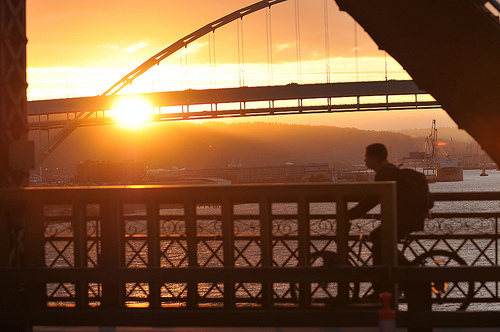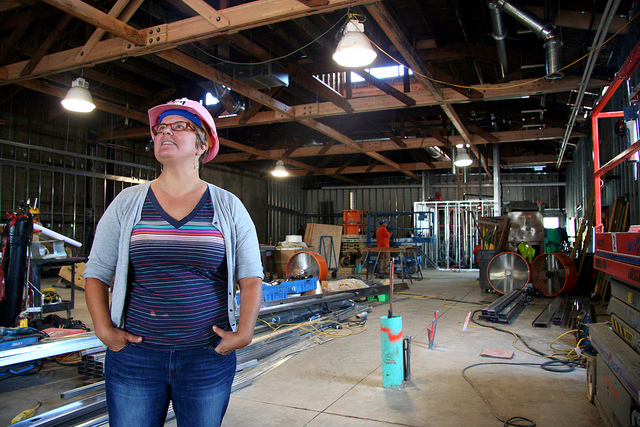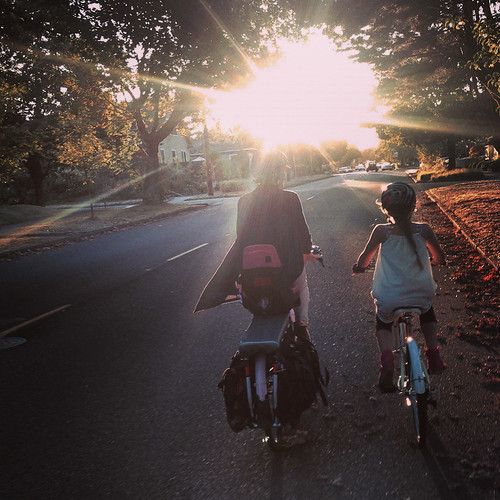Somewhere along the path to becoming one of the dirtiest words in local politics, a funny thing happened to bicycling in Portland in 2014.
If Portland can again build its political momentum toward improving biking, it’ll be more able to take advantage of that momentum than any city in the country.
It started to make an impact where it matters most: Not in photo ops or political promises; but in solidifying key pieces of the foundation required to build lasting change.
If this was the year Portland came to terms with the fact that it’s no longer leading the country in improving biking, it was also the year that gave the city its clearest signs ever of the cultural changes that bike-friendliness can make possible.
The catch is that cultural changes can take 10 years or more to show up. The ship may have stopped moving a few years ago, but the waves from its wake are still hitting the shoreline.
It all adds up to this: if Portland can again build its political momentum toward improving biking, it’ll be more able to take advantage of that momentum than any city in the country.
How does this all work? The answer is written between the lines of the stories we covered this year.
Our retailers are building business models around biking
Green Zebra Grocery is just the beginning of this story. But what a beginning.
Lisa Sedlar’s healthy-convenience-store startup, which said in October that it’s preparing to open its second location and laying the groundwork for its third, is the business Portland planners have dreamed about for decades. Designed to be the anchor of a “20-minute neighborhood” by selling quality fresh food in areas that can’t support full-size supermarkets, it’s also put bikes at the center of its strategy, sparing no expense to construct the city’s best retail bike parking and supporting bike lanes and crossing improvements on Lombard Street.
That’s not all. Love them or hate them, the cookie-cutter retail strips of Portland’s development boom — Salt & Straw, Pine State Biscuits, Little Big Burger — seem to be here to stay. And there’s a reason these thriving local chains always jump into sidewalk-facing storefronts where car parking is scarce rather than strip malls with dedicated parking: the rent is cheaper and the parking lots are redundant because plenty of customers arrive without cars. Out-of-town chains like Baskin-Robbins or Five Guys burgers either haven’t figured this out yet or aren’t taking advantage of it; in the meantime, it’s hard to blame local entrepreneurs for expanding as fast as they can across Portland’s low-car eastside grid.
Our real estate developers have entered an ever-escalating battle for bike-friendliness
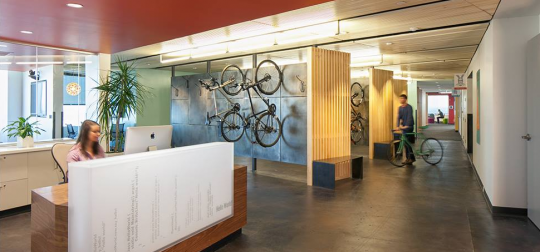
In other cities, bike users are thrilled to have a nice indoor bike parking room in their apartment building. Here in Portland, it looks like we’re about to get a building (419 E. Burnside) with an entire “bicycle lounge” that also features free coffee and Xbox.
I learned this fall how hot the race is to be the city’s bike-friendliest apartment building when I was talking to Wade Lange, the local manager of the huge Hassalo on Eighth development in the Lloyd District. Not only had he read the article we’d posted three weeks before about a local family’s struggles to find cargo bike parking space — his team had already made plans to avoid the problem by setting aside dedicated space in their buildings for cargo, recumbent and electric bikes.
Last year, on-site bike repair stands became standard at new apartment buildings that wanted bike-friendly branding; this year, bike-maintenance vending machines joined the list. Hassalo on Eighth will include a free 12-hour-a-day bike valet and on-site bike shop. New Relic, a fast-growing software company, negotiated a luxurious and beautiful bike parking area into its office lease and dedicates 10 percent of its precious downtown office space to the purpose.
Our activists are back, and they’re badass
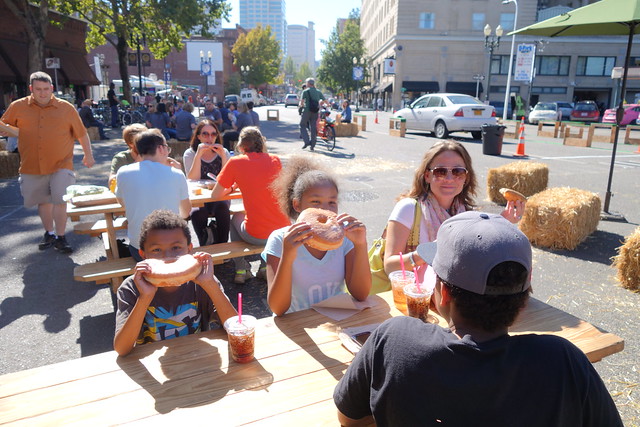
(Photo: Greg Raisman)
In the last few years, the Bicycle Transportation Alliance has made a strategic and perfectly reasonable decision to focus more of its work on Portland’s suburbs. As the advocacy group’s leader Rob Sadowsky told us in May, succeeding in the suburbs sometimes requires softening its radicalism in Portland.
But no sooner did the BTA zig than Portland’s grassroots activists began to zag. This summer and fall, two new volunteer groups, Better Block PDX and BikeLoudPDX, sprung to the front of the city’s consciousness with the sort of direct actions the BTA has decided to avoid.
Better Block, founded two years ago, built an audacious three-day demo of a radically redesigned NW/SW 3rd Avenue with a protected bike lane, pedestrian plazas and a single lane for cars to use. It was a smashing success and seems to have completely changed the neighborhood vision of how to improve Old Town.
BikeLoud, which started after BikePortland reader Alex Reed, reading a comment thread about Portland’s need for a more assertive advocacy group, impulsively typed “I’ll help start one!” and hit “post.” That was the start of a combination of guerrilla actions and traditional advocacy that have already prompted a major review of the city’s neighborhood greenway policy and a proposed new traffic diverter on Southeast Ankeny.
BikeLoud’s message has been so popular that its brand has even been co-opted — this month some people anonymously installed a set of beautiful handmade guerrilla traffic diverters on Clinton, describing themselves as “BikeLoud members” even though the organization hadn’t officially signed off on the plan.
One of the most encouraging signs of all: BTA staffers, who of course share BikeLoud’s goals, have been keeping in touch with the new group behind the scenes. That’s a sign of a truly healthy advocacy ecosystem: The BTA can play one role, BikeLoud can play another, and the whole city will win. It’s a level of sophistication that activists in other cities can only dream of.
Advertisement
Our bureaucracy is an all-star team of bike believers
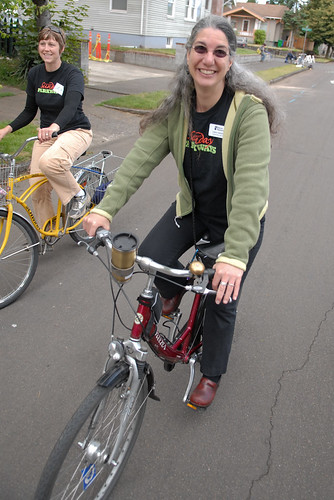
Ginenthal during the Sunday Parkways event that she has
helped shepherd into a revered Portland tradition.
(Photo by J. Maus/BikePortland)
You’ve got to feel sorry for anti-biking skeptics who cheered when former Transportation Director Tom Miller was hounded out of office early last year. Some of them presumably thought they had just cut the head off the beast.
Oops. The beast turned out to be a hydra.
Four months after Miller got sacked, the city’s new mayor and transportation commissioner hired Leah Treat, one of the two closest deputies of one of the country’s most prominent pro-bike bureaucrats, Gabe Klein. (Klein’s other sidekick, Scott Kubly, is now Treat’s counterpart in Seattle.) Treat showed her colors almost immediately, at one point brushing off her own spokesman’s advice and proudly posing for a photo with a bicycle. In February, she went off-script in a podcast interview to say that Vision Zero would be part of Portland’s transportation agenda. She’s also reorganized her department to prioritize long-term plans and thrown herself headfirst, nights and weekends, into the city’s fight for street-improvement funding.
Needless to say, the team Treat leads remains the most bike-oriented transportation department in the United States. From road diet pioneer Rob Burchfield to outreach innovator and Sunday Parkways superstar Linda Ginenthal, there’s only one way to assemble this much talent and knowledge about how to build a great biking city: spend 20 years as the most pro-bike large city in the country.
Portland built. The nation’s bike-friendliest bureaucrats came. If our city has stopped improving its streets, it’s not because they’ve forgotten how. It’s because we’ve forgotten why.
We killed the Columbia River Crossing
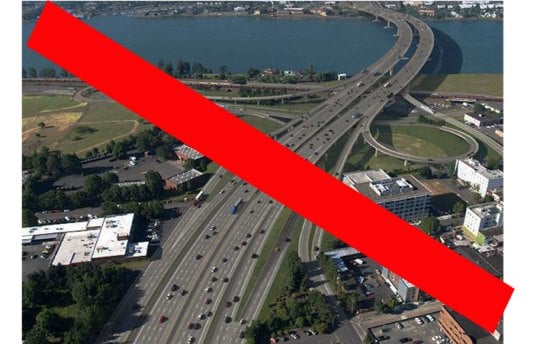
(Image: CRC project rendering)
The single biggest biking victory of 2014 might be the best illustration of Portland’s strengths, because the way we won shows exactly what we’ve lost.
When Oregon’s legislature finally pulled the plug this year on the Columbia River Crossing freeway-rail expansion of Interstate 5, people with short memories said it had been killed by toll-hating conservatives in Washington, not freeway-hating urbanists in Portland.
Baloney. This was a victory for the left as much as for the right.
Step back to see the full picture, and here’s how the Columbia River Crossing died over the course of several years: Portlanders successfully controlled the terms of the deal, making it too progressive for conservatives to sign.
The people to thank for this are two of the most freeway-skeptical, bike-and-transit-friendly leaders the region has ever seen — former Portland Mayor Sam Adams and former Metro President David Bragdon — and the thousands of Portland activists who convinced Adams and Bragdon to keep their distance from the construction and freight interests who wanted more freeway at any cost. They and other progressive Oregon officials (including, yes, Rex Burkholder) refused to support a project without both light rail and tolls. Meanwhile, they wrestled the freeway crossing from 12 lanes down to 10.
That combination was too much for Washington conservatives to swallow. The state’s Republican senate walked away from the deal in 2013, leaving Oregon’s legislature to turn out the lights in March 2014.
In most of this country, $800 million in federal grants could bulldoze through this sort of regional dispute. But Portland stopped the bulldozers with a story — a story it’s since misplaced.
The missing piece of Portland’s puzzle
Here’s the story we’ve forgotten how to tell: Portland can and must become a city where it’s easy and comfortable to get around without a car.
It’s not a story about cars being bad. It’s a story about life being good.
Those 18 words aren’t the whole story, of course, just the heart of it. Different cities embrace biking and low-car life for different reasons. In Austin this year, bike believers have told a story about making room for economic growth without freeway congestion. In Pittsburgh and Calgary, they’ve talked about building cities that young people want to move to rather than flee from. In Portland back in 2007, the leading story was probably that biking is necessary for avoiding catastrophic climate change.
Whatever a city’s reason is for wanting to make bike transportation mainstream, it can’t succeed without making hard choices: choices that create winners and losers. And a city can’t make choices like that without a story that explains why they’re necessary, and how we’ll all become winners in the long run.
Even our biggest triumph in years, the improbable death of the Columbia River Crossing, will only deliver on its promise if we can keep the story going. Like the Mount Hood Freeway before it, a highway that became a light-rail line, the Columbia River Crossing needs to be remembered as the project we rejected in order to build something else.
Portland’s last decade proved that investments in great biking can transform a city’s culture. Its next decade will prove that a pro-bike culture can transform a city’s politics.
In other words, we are the change that Earl Blumenauer and Mia Birk and Elsa Coleman and Jay Graves and Lenny Anderson and thousands of others were waiting for.
Happy new year, Portland. Let’s do this.
